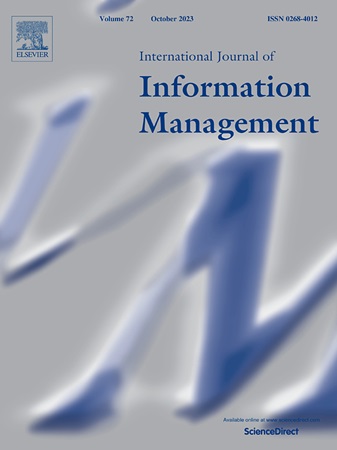为研究文章设计基于本体的搜索系统
IF 27
1区 管理学
Q1 INFORMATION SCIENCE & LIBRARY SCIENCE
International Journal of Information Management
Pub Date : 2025-03-15
DOI:10.1016/j.ijinfomgt.2025.102901
引用次数: 0
摘要
由于现有研究的迅速扩大,进行科学文献综述的过程正变得越来越复杂和耗时。流行的学术搜索引擎提供有限的过滤功能,并且精度较低。机器学习增强的方法往往针对相当特定的领域,而基于生成式人工智能的新方法则容易产生幻觉。本文利用信息觅食理论,提出了一个设计科学研究项目,旨在为开发研究文章的特定领域搜索系统生成设计知识。我们的贡献包括:(1)将领域本体与大型语言模型集成以设计基于本体的搜索系统;(2)通过探索问题空间生成描述性设计知识;(3)生成用于开发特定领域搜索系统的规定性设计知识;(4)提出基于本体的搜索引擎原型。我们的研究结果表明,提出的解决方案支持研究人员通过增加信息获取,同时降低交互成本来进行文献综述。本文章由计算机程序翻译,如有差异,请以英文原文为准。
Designing ontology-based search systems for research articles
The process of conducting scientific literature reviews is becoming increasingly complex and time-consuming due to the rapid expansion of available research. Popular academic search engines offer limited filtering capabilities and suffer from low precision. Machine learning-enhanced approaches tend to target rather specific areas, and novel approaches based on generative artificial intelligence suffer from hallucinations. Drawing on information foraging theory, this article presents a design science research project aimed at generating design knowledge for developing domain-specific search systems for research articles. Our contributions include: (1) integrating domain ontologies with large language models to design ontology-based search systems, (2) generating descriptive design knowledge by exploring the problem space, (3) generating prescriptive design knowledge for developing domain-specific search systems, and (4) presenting an ontology-based search engine prototype. Our results indicate that the proposed solution supports researchers in conducting literature reviews by increasing information gain while reducing interaction costs.
求助全文
通过发布文献求助,成功后即可免费获取论文全文。
去求助
来源期刊

International Journal of Information Management
INFORMATION SCIENCE & LIBRARY SCIENCE-
CiteScore
53.10
自引率
6.20%
发文量
111
审稿时长
24 days
期刊介绍:
The International Journal of Information Management (IJIM) is a distinguished, international, and peer-reviewed journal dedicated to providing its readers with top-notch analysis and discussions within the evolving field of information management. Key features of the journal include:
Comprehensive Coverage:
IJIM keeps readers informed with major papers, reports, and reviews.
Topical Relevance:
The journal remains current and relevant through Viewpoint articles and regular features like Research Notes, Case Studies, and a Reviews section, ensuring readers are updated on contemporary issues.
Focus on Quality:
IJIM prioritizes high-quality papers that address contemporary issues in information management.
 求助内容:
求助内容: 应助结果提醒方式:
应助结果提醒方式:


